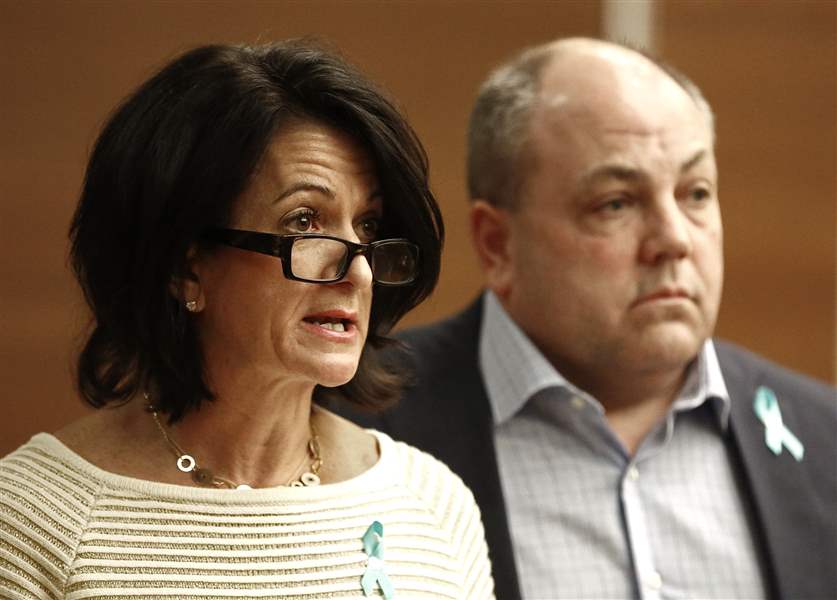
Tokes family sues state, claims negligence resulted in Reagan's death
5/18/2018
Reagan Tokes' mother, Lisa McCrary-Tokes, left, makes a statement in court as her husband, Toby Tokes, right, listens during sentencing on Wednesday, March 21, 2018.
COLUMBUS DISPATCH
COLUMBUS — The family of slain Ohio State University senior Reagan Tokes has filed a wrongful death suit against the state, claiming its failure to properly monitor her killer played a role in her death.
The complaint — filed by Ms. Tokes’ estate, her parents, and her sister — was mailed to the Ohio Court of Claims by its Cincinnati attorney, Robert B. Newman.
Brian Lee Golsby, 30, was convicted of the murder, rape, kidnapping, and robbery of the 21-year-old psychology major, formerly of Monclova Township, after she left work at a Columbus restaurant on the night of Feb. 8, 2017. He was sentenced to multiple terms of life in prison without possibility of parole.
He had been released from state prison the prior November after completing a six-year sentence for attempted rape. He was a registered sex offender, had been labeled high risk, and was staying in a release program’s residential facility.
He’d also been equipped with an ankle GPS monitor, but the device was not monitored in real time. Despite the monitor Golsby carried out a series of robberies and assaults in the days immediately prior to encountering Ms. Tokes at random as she approached her car that night.
He kidnapped her, forced her to withdraw cash from an automated teller machine, raped her, and took her car and purse.
“Reagan Tokes’ last words, according to Golsby’s later confession, were, ‘I just want to live’,” the suit reads. “Golsby then shot Reagan Tokes twice in the back of the head, and left her nude body in the snow.”
The data was later used to place him at the scene of each crime and played a key role in his convictions.
The suit names as defendants the Department of Rehabilitation and NISRE, Inc., a private company in Columbus that operates the residential facility, a kind of halfway house, to which Golsby was sent after his release.
The suit states that NISRE is paid up to $1.1 million to provide up to 93 placements at $33 per day per resident.
It claims the department’s Adult Parole Authority was negligent in failing to monitor the GPS device in real time, failing to arrest Golsby after he violated conditions of his release three times, and placing him in the halfway house.
It also claims the state failed to require the program to promptly notify it of Golsby’s infractions and said the program failed to monitor its residents for weapons.
The result “is that Golsby was neither arrested nor put under more restrictive conditions,” the suit reads. “The ultimate consequence of the negligence of DRC/APA was the death of Reagan Tokes.”
Her family, Toby Tokes and Lisa McCrary-Tokes, and sister Makenzie, now living in Florida, cite the loss of Reagan’s companionship, their own mental anguish, and the estate’s loss of her future income in seeking a jury trial and an unspecified amount of compensatory damages.
“As a result of the negligence of DRC, Reagan Tokes was kidnapped and brutally raped,” the suit reads. “During this time she suffered conscious pain and suffering.”
The Tokes family has sought reforms in state sentencing and parole supervision law since Reagan’s death and has seen partial success so far. Soon after Golsby’s conviction, the state Senate passed Senate Bill 201, the “Reagan Tokes Act,” to reintroduce indefinite sentencing — with maximum and minimum sentences — for those convicted of certain felonies.
The idea is to allow judges to use the threat of extended sentences to get inmates to behave and better themselves while behind bars before being released back into society.
That bill is pending in the Ohio House of Representatives.
But lawmakers have not acted on a companion bill that would mandate real-time monitoring of GPS devices with prompt alerts of violations. It would also require increased parole-officer staffing to reduce caseloads.
The Court of Claims hears cases seeking money damages from state agencies. DRC said it would not comment on pending litigation.
Contact Jim Provance at: jprovance@theblade.com or 614-221-0496.